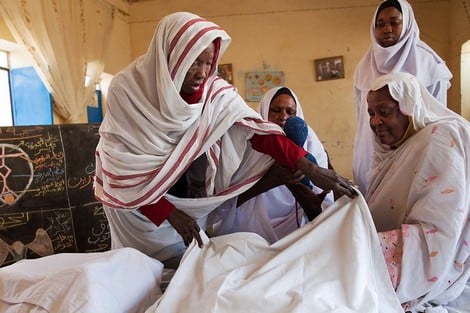War Doubles Female Genital Mutilation Rates in Sudan
Omdurman – Report by Bakhita Zayed Al-Safi

Despite the increased public awareness in Sudan, the existence of laws criminalizing the practice of female genital mutilation (FGM), and the emergence of many women’s groups and human rights organizations opposing its continuation, the consequences of war have contributed to the resurgence and spread of the practice—particularly after thousands of families were displaced to rural areas.
FGM involves the deliberate mutilation of female genitalia, often carried out using procedures and protocols that violate medical regulations—especially by doctors, midwives, and families who still perform these operations both secretly and openly in certain cities, states, and rural areas. This continues despite the presence of legal provisions criminalizing such violations, which remain outside the scope of effective oversight.
Many women’s groups in Sudan fear the spread of this practice, particularly in the context of ongoing war and the absence of the authorities responsible for enforcing the law.
A Traditional Practice
In a village in Nile River State, 14-year-old “M” and her younger sister “A” were subjected to FGM despite their mother’s objections and under the insistence of their grandmother, the matriarch of the extended family. She pressured her son to approve the operation, claiming it was a tradition in the area and that every girl must undergo it, or else face lifelong stigma.
The girls’ mother told Mashaweer platform, with deep sorrow, that she felt powerless against the dominance and control of the grandmother. Despite her determination to prevent the procedure, she had hoped her husband would stand up to his mother. Instead, he gave in, believing the practice was best for his daughters and was a safeguard for honor and chastity.
Health Problems
“M” said she suffered severe bleeding and a serious infection in her genital area. She underwent a difficult treatment process, which caused her deep psychological trauma, severe depression, and acute nervous shock.
She explained that she became withdrawn, avoiding social interaction, and nearly developed autism-like symptoms. She is determined that, if she grows up, marries, and has daughters, she will never subject them to this painful and cruel procedure.
Her younger sister “A” also recounted severe suffering and difficulty, saying the procedure was unbearably painful, making her scream uncontrollably. She still experiences nighttime disturbances and intense fear whenever she recalls the ordeal.
The Impact of War
Sudanese citizen Samia Ahmed told Mashaweer that “the consequences of war were the main reason for the circumcision of my daughters. If we had not been forced to flee to rural areas, we would not have abandoned our core values and given in to harmful customs.”
She lamented the prevailing community mindset that views FGM as necessary according to tradition. Even though her husband refused the practice and threatened to report her to authorities if the child was harmed, the grandmother took advantage of his absence and, without consulting the mother, took the child to a midwife. The procedure nearly cost the girl her life due to heavy bleeding, which was only stopped by a doctor present in the area. Hospitals were out of service at the time due to ongoing conflict and bombing. The father later insisted on taking legal action against both the grandmother and the midwife.
Midwives Without Medical Standards
Dr. Samah Mirghani, a consultant, told Mashaweer that “FGM is a major threat to children and youth in the future, as it poses serious health risks to young girls and can lead to death.”
She added, “In my medical career, I have witnessed women die during childbirth due to complications from FGM—three of them were close friends of mine. There are also psychological consequences, such as a fear of marriage and sexual activity due to chronic pain.”
Mirghani warned that FGM often causes recurrent miscarriages, delayed fertility, and severe cervical infections due to scar tissue from childbirth surgeries. She noted that many rural areas in Sudan lack integrated healthcare, and midwives operate without proper medical requirements, such as sterilization or medical kits. Alarmingly, some use traditional rope fibers for stitching, which causes serious long-term health complications.
She further noted the lack of pre-operative blood clotting tests, leading to deaths from uncontrolled bleeding caused by deliberate negligence and failure to follow medical protocols.
Absence of the Law
Due to prevailing community perceptions about the importance of chastity and honor for girls, FGM in Sudan remains a thorny and complex issue—intertwined with social, cultural, and religious beliefs.
Human rights lawyer and activist Nouman Al-Sharif told Mashaweer that “there is no comprehensive law criminalizing FGM in Sudan. Existing regulations are limited to orders preventing medical professionals from performing such operations. Yet, these have not reduced the prevalence, as many medical personnel continue the practice in secret—even in the capital, Khartoum.”
He explained that “the practice has deep-rooted cultural ties, and public awareness is still insufficient to stop it, especially in Northern Sudan, West and South Darfur, remote areas of Sennar State, and the Blue Nile State.”
Al-Sharif urged human rights defenders to “organize advocacy campaigns to combat harmful traditions and end the crimes committed against Sudanese girls.” He noted that from 2003 to April 2023, multiple awareness campaigns and women’s rights programs had helped reduce rates in some states. However, the practice remains alarmingly high, especially in Darfur, Northern Sudan, Kordofan States, and marginalized regions. Thanks to education and awareness, some families in Wad Madani, Gezira State, and Khartoum have abandoned the practice.
Advocacy and Opposition
Women’s groups in Sudan have long worked to eliminate FGM, and their efforts have contributed to positive change.
Women’s rights activist Hala Al-Tayeb told *Masha




